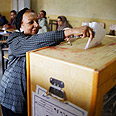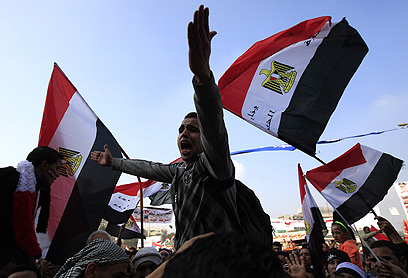
Egypt Brotherhood says won't impose Islamic values
Deputy head of Brotherhood's new political party says, 'We want to apply the basics of Shariah law in a fair way that respects human rights.' Journalist: Clash between ruling military council, future parliament inevitable: 'Tahrir Square will erupt again
Egypt's Muslim Brotherhood, emerging as the biggest winner in the first round of parliamentary elections, sought Saturday to reassure Egyptians that it would not sacrifice personal freedoms in promoting Islamic law.
The deputy head of the Brotherhood's new political party, Essam el-Erian, told The Associated Press in a telephone interview that the group is not interested in imposing Islamic values on Egypt, home to a sizable Christian minority and others who object to being subject to strict Islamic codes.
Related articles:
"We represent a moderate and fair party," el-Erian said of his Freedom and Justice Party. "We want to apply the basics of Shariah law in a fair way that respects human rights and personal rights," he said, referring to Islamic law.
The comments were the clearest indication that the Brotherhood was distancing itself from the ultraconservative Islamist Nour Party, which appears to have won the second-largest share of votes in the election's first phase.
The Nour Party espouses a strict interpretation of Islam similar to that of Saudi Arabia, where the sexes are segregated and women must be veiled and are barred from driving.
Egypt's election commission has released few official results from the voting on Monday and Tuesday. But preliminary counts have been leaked by judges and individual political groups showing both parties could together control a majority of seats in the lower house of parliament if they did form an alliance.
The Brotherhood recently denied in a statement that it seeks to form an alliance with the Nour Party in parliament, calling it "premature and mere media speculation."
On Saturday, el-Erian made it clear that the Brotherhood does not share Nour's more hard-line aspirations to strictly enforce Islamic codes in Egyptians' daily lives.
"We respect all people in their choice of religion and life," he said.
Another major check on such an agenda is the council of generals who have run the country since President Hosni Mubarak's ouster in February. The military council, accused by Egypt's protest movement of stalling a transition to civilian and democratic rule, is seeking to limit the powers of the next parliament and maintain close oversight over the drafting of a new constitution.
Egypt already uses Shariah law as the basis for legislation, however Egyptian laws remain largely secular as Shariah does not cover all aspects of modern life.
On its English-language Twitter account, the Brotherhood said that its priorities were to fix Egypt's economy and improve the lives of ordinary Egyptians, "not to change (the) face of Egypt into (an) Islamic state."
El-Erian urged the Brotherhood's political rivals to accept the election results.
"We all believe that our success as Egyptians toward democracy is a real success and we want everyone to accept this democratic system. This is the guarantee for stability," he said.

Civil unrest to resume? Tahrir Square (Photo: EPA)
For decades, Mubarak's regime suppressed the Brotherhood, which was politically banned but managed to establish a vast network of activists and charities offering free food and medical services throughout the country's impoverished neighborhoods and villages.
It is the best organized of Egypt's post-Mubarak political forces.
The vote for parliament's lower house is taking place over three stages, with 18 provinces in Egypt yet to vote.
After Egypt's ruling Military Council said it was deeply concerned by the apparent victory of the Muslim Brotherhood and Salafi al-Nour parties in the first round of elections, some in the Arab country have warned that riots in Tahrir Square – a symbol of the uprising against Mubarak's regime – would erupt again.
"A conflict between the ruling council and the future parliament is inevitable," senior journalist Emad El-Din Adeeb told the Al Masry Al Youm daily. "I do not support the Muslim Brotherhood's ideas, but I believe the council will try to 'buy' parliament members with political promises. This will not be accepted at Tahrir Square – which remains the national conscious."
According to reports in Egypt, the Supreme Council of the Armed Forces was "vexed and concerned" by the results and fears even worse results in the next two election rounds.
The Justice Party, for its part, thanked "this great nation for its civil and positive conduct. The parliament's final composition will express – in a balanced way – all segments of Egyptian society."
The US has apparently come to terms with the fact that it would have no other choice but to cooperate with the Brotherhood. On Friday State Department spokesman Mark Toner said the Obama
Administration had contacted the Muslim Brotherhood, adding that Washington was not worried about the nature of winning parties in Egypt’s elections - whether they were Islamists or liberals.
A senior Military Council official told the al-Hayat daily that "liberal circles focused on us and failed to understand that we are not the problem."
The official Al-Ahram newspaper reported Saturday that prominent businessmen were considering leaving the country because they fear the "religious movement." According to the report, many wealthy Egyptians fear a victory for the Brotherhood would lead to the enforcement of a religious lifestyle in the country.
- Follow Ynetnews on Facebook and Twitter
- Receive Ynetnews updates directly to your desktop










